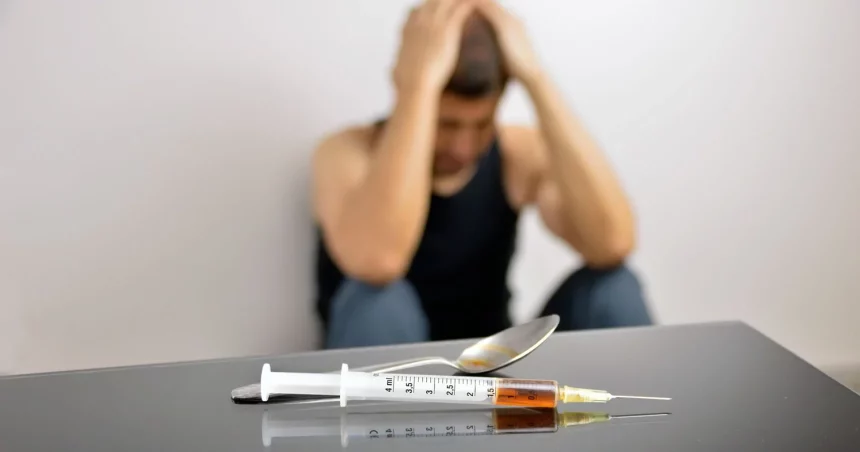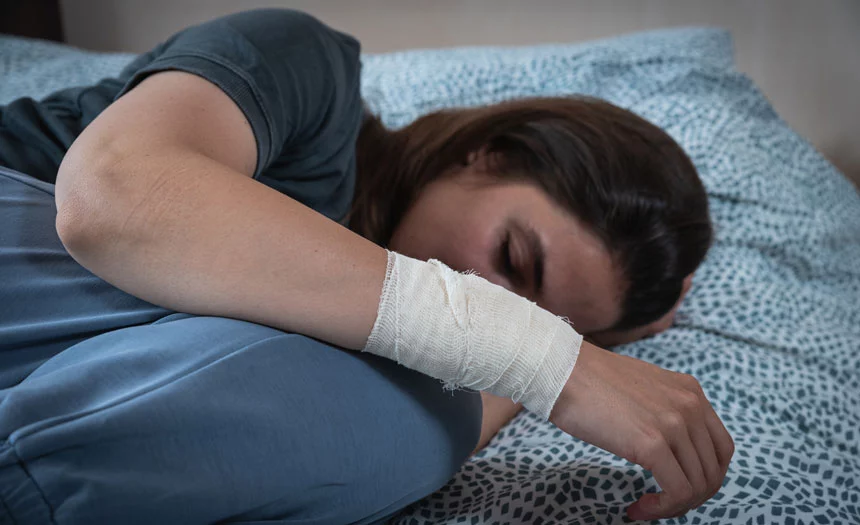What Is Heroin Detoxification?
Table of Contents
Recovery from active heroin addiction begins with detox. After a person has been using heroin for a period of time, their body gets accustomed to the drug and learns to function with the drug. Once heroin detox begins, so will different forms of withdrawal symptoms.
Withdrawal symptoms can be seen as the effects of stopping an action, substance, or process suddenly and in this case, heroin withdrawal symptoms. An individual typically experiences withdrawals during their detoxification.
Detoxification refers to filtering all remnants of a drug or substance from the body of an individual. It also refers to the specific detox program available to individuals. Our bodies will naturally detox through removing and filtering out substances. This process is what causes our bodies to experience withdrawals.
Keep reading to find out more about how heroin detox works, and what to look for when planning detox for yourself or a loved one.
When Does Heroin Withdrawal Begin?

Heroin withdrawals can begin anywhere from 6-12 hours after the last dose of heroin and can last for 3-4 days or even weeks depending on how heavy a user that person was. Individuals who used heroin excessively typically had more heroin molecules to remove from their body.
In order to detox from heroin the body goes through rigorous, uncomfortable and even painful withdrawal in order to clear the body of the drug. Going through heroin detoxification can make the person feel as if their body is tearing itself apart.
This is the body’s way of demanding more heroin. It can seem impossible to overcome heroin addiction however, knowledge and hope help significantly. Being aware of what is to come can better prepare an individual for mentally processing the battle that is to come.
No matter how uncomfortable or unpleasant the detoxification is, the high from heroin also comes with the intense lows. The lows are never worth it. Luckily, there is a vast amount of detox methods and professionals that can medically assist with the process.
How Does Heroin Affect Someone?
Heroin works in many different ways within an individual and can affect the functions of the brain and the body. As heroin enters the bloodstream, it quickly finds its way into the brain and attaches to opioid receptors.
Heroin stimulates these opioid receptors which affects many aspects of the individual including energy, pain, pleasure, and breathing. Since heroin is a central nervous system depressant, energy levels and pain are lowered while pleasure rises.
For more information on how heroin wo rks in the body and brain, keep reading here!
Tapering Off Heroin Rather Than Quitting Cold Turkey
Quitting heroin cold turkey is very dangerous, especially after long term use. With the continued use of heroin, our bodies will become accustomed to functioning with heroin and require it to maintain proper functions.
Some of these can be seen in the severe withdrawal symptoms which include:
- Restlessness
- Severe muscle and bone pain
- Insomnia
- Diarrhea and vomiting
- Cold flashes with goosebumps
- Uncontrollable leg movements
- Severe heroin cravings
These symptoms make it detrimental to slowly stop using heroin with the safest way to do this is to undergo drug detoxification programs. To cope with these symptoms, individuals often relapse to cope with this experience.
The dangers with this come from stopping use. As an individual’s tolerance towards heroin begins to diminish, they may resort to taking the same amount of the drug that they were taking originally and end up taking more than their body can handle.
Unfortunately, this can lead an individual to accidentally overdose which, in some cases, may result in death. Keep reading for more information on withdrawal symptoms, overdosing, detoxification, and treatment!
Heroin Withdrawal Symptoms
To quit heroin is to experience the uncomfortable withdrawal symptoms that are to come. Withdrawal symptoms are a major aspect of drug detoxification and so it is important to be aware of the heroin withdrawal symptoms.
Understanding what is to come or what you may experience can better prepare you and allow you to succeed through undergoing detoxification. According to the National Institute on Drug Abuse, the mental and physical symptoms of heroin withdrawal include:
Short Term
- Dry mouth
- Warm flushing of the skin
- Heavy arms and legs
- Nausea
- Scratching
- Clouded mental functioning
Long Term
- Insomnia
- Collapsed veins (Seen in intravenous use)
- Damaged nasal tissue (Seen in nasal ingestion)
- Heart infections
- Abscesses
- Constipation and stomach cramping
- Liver and kidney disease
- Lung complications
- Mental disorders
- Depression
- Antisocial personality
- Sexual dysfunction
- Irregular menstrual cycles
Can Someone Overdose On Heroin?
Yes, it is possible to overdose on heroin. Taking in too much of the drug can cause an overdose to happen within an individual. An overdose can cause life-threatening effects to occur within the body.
One of the most dangerous effects is respiratory depression. This leads to an individual intaking an insufficient amount of oxygen within the body which can lead to a condition called hypoxia. Being unable to take in a proper amount of oxygen can result in permanent damage or even death.
How Does Heroin Detoxification Affect the Body?
The detoxification process has numerous effects on a person, both physically and mentally. Stopping use will cause an individual to go through and experience the unwanted withdrawal symptoms that come with heroin use.
While every individual will experience symptoms, it is important to understand that each individual can and will experience a range of symptoms that vary depending on that particular individual. The severity and duration of withdrawal will vary per person as well.
Heroin detoxification on its own is not life-threatening however, some of the symptoms presented from detox may cause complications that can lead to life-threatening situations. Because of this, most people going through detox seek a professional detox center.
What To Expect From Detoxification
Detoxification is one of the first, and most important phases of the substance abuse recovery journey for individuals. Heroin abuse is often a severely difficult experience and requires proper treatment and care to overcome.
Detoxification programs support individuals through the withdrawal process to begin drug abuse recovery without the presence of the drug in their system. In many cases, an individual is provided with medications to process and move through this experience.
This makes the difficulty in overcoming this process much more manageable. This medication is provided from trained medical staff to ensure proper administration. It is important to note that detoxification is not addiction treatment, it is the prerequisite to addiction treatment.
With that said, individuals undergoing detox will become familiar with what is to come with addiction treatment and understand the importance of undergoing addiction treatment. Addiction treatment meets the needs of an individual to lead a stable life.
Detoxification Options

There are many different forms of detoxification that an individual can undergo for proper treatment. These options allow for someone to find what program works for them. This supports an individual’s needs as well as their financial capabilities for treatment.
A heroin detox program will typically have mental health professionals available to support individuals through intense symptoms.
Inpatient Heroin Detoxification
Inpatient detox requires an individual to live on-site at a treatment center to receive treatment. This is often referred to as a medical detox program. This program allows for an individual to receive 24-hour medical attention and support through intense withdrawals.
With the many withdrawals that can arise, trained medical staff can provide an individual with the support they need to comfortably get through this process. The medical staff is able to administer medications to support the functions of an individual.
Outpatient Heroin Detoxification
Outpatientdetox allows an individual to receive treatment during the day and return home after receiving treatment. This detoxification program is called ambulatory detoxification. Ambulatory detox is implemented when an individual is at low risk of severe withdrawal.
In other words, this treatment is only available for individuals struggling with moderate to mild symptoms. The reason for this is that individuals struggling with severe symptoms require more attention and care which cannot be provided during the night.
There is also the understanding that mild to moderate symptoms are more manageable throughout the periods away while still receiving treatment and support that they need.
Rapid Opioid Detoxification (ROD)
This was originally created to allow individuals to avoid many of the uncomfortable and severe symptoms. During this treatment, individuals are sedated and then given a medication like Naloxone which blocks opioids from attaching to specific cell receptors within the body.
In this, some individuals are able to avoid many difficult experiences; however, they are at risk of having many health issues suddenly arise. Many individuals who underwent rapid opioid detoxification required hospitalization the day after for arising conditions.
There were even some individuals who died. This form of detoxification carries many risks with the better options being with the medical or ambulatory detox.
At-Home Detox
It is very dangerous to take on detoxing from heroin alone at home. Without proper care or assistance through the difficult withdrawals of stopping heroin use, an individual may face life-threatening circumstances.
During a detoxification program, an individual has supportive care through difficult situations and slowly transitions to not requiring as much attention or treatment due to the lessening of withdrawal symptoms.
Oftentimes there are many individuals who are struggling through withdrawals and use other substances as a method of coping with their experience. This doesn’t allow individuals to properly recover from substance abuse.
All this does is cause an individual to rely upon another harmful substance. It is important to abstain from drugs and remain sober through detoxification. Not only is this similarly harmful to recovery but other substances can worsen the effects of withdrawals.
Addiction Treatment After Detox

After detoxification comes post-acute withdrawal symptoms. These symptoms typically include difficulties with mental health including mood disorders like depression. Depression is a part of the mental and emotional withdrawal symptoms.
Many individuals that struggle with substance abuse or addiction also have mental health disorders. Mental health disorders are a type of psychiatric condition in which an individual’s mood, thoughts, feelings, and perception are altered.
Unfortunately, this altered experience can lead to using an addictive substance, such as heroin, as a way of coping or dealing with their experience. Thankfully, mental health professionals are typically available at treatment centers to allow for individuals to receive the proper treatment they need.
There are a variety of different treatment types which can be provided in the inpatient or outpatient settings. There are two main forms of therapy: pharmacotherapy and behavioral therapy.
Pharmacotherapy
Pharmacotherapy includes addiction medicine to support individuals through addiction. Although not every substance has a medication, heroin and other opioids have medications which work against opioids in the body.
These medications are able to attach to the same receptors as opioids and block other opioids from attaching to them. This can assist in diminishing the cravings within individuals as well as allow an individual to function without opioids.
Behavioral Therapy
Behavioral therapy is one of the best forms of therapy for assisting an individual struggling with heroin addiction, heroin withdrawal, or even substance abuse in general. This allows for individuals to relearn and build skills to return to their lives.
Many of the skills learned work to provide an individual with a stable life-style. Individuals are able to promote and build healthy relationships, properly cope or manage emotions, stress, and difficult situations.
Cognitive Behavioral Treatment (CBT) is one of the many behavioral treatments available for recovery. CBT works by informing individuals the pros and cons of substance abuse as well as teaching many other skills which include relapse prevention and stress management.
These two forms of therapy work best when used together to allow for an individual to truly thrive through recovery. Pharmacotherapy allows an individual to have a better, more attentive presence in behavioral therapy, which in turn provides a better retention within the individual.
Top Heroin Detox Options: Found Here
Heroin use will always lead an individual to experience withdrawal symptoms however, it is immensely difficult to manage these withdrawals, especially while trying to find treatment. Here at Find Addiction Rehabs, we make finding treatment easy.
Whether finding a treatment center in your location or connecting you with recovery tools and resources, our hotline is available 24/7 to make sure you can get the help you need, anytime you need it.
Heroin is an intense substance that can cause significant changes to many aspects of your life. Call us today and we will help you find the right treatment that suits your needs!

